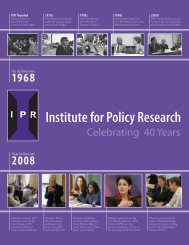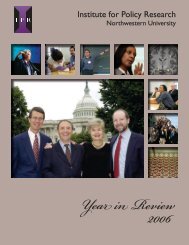Whatever Happened to the Emerging Democratic Majority?
Whatever Happened to the Emerging Democratic Majority?
Whatever Happened to the Emerging Democratic Majority?
Create successful ePaper yourself
Turn your PDF publications into a flip-book with our unique Google optimized e-Paper software.
P. Reese<br />
15<br />
Learning Experiences<br />
Northwestern undergraduates discover research and<br />
public policy firsthand<br />
Undergraduate Series on Race,<br />
Poverty, and Inequality<br />
Each year for <strong>the</strong> past three years, a<br />
group of undergraduates has come<br />
<strong>to</strong>ge<strong>the</strong>r <strong>to</strong> organize<br />
a series dedicated <strong>to</strong><br />
examining <strong>the</strong> problems<br />
of race, inequality, and<br />
poverty that persist in<br />
American society and<br />
its institutions.<br />
In 2004-05, <strong>the</strong><br />
Northwestern Undergraduate<br />
Lecture<br />
Series on Race, Poverty,<br />
and Inequality<br />
tackled <strong>the</strong> subjects of<br />
No Child Left Behind,<br />
health care, and racial<br />
inequality in education. Led by juniors<br />
Martin Zacharia and Tyler Jaeckel, <strong>the</strong><br />
series brings <strong>to</strong>ge<strong>the</strong>r policymakers,<br />
academics, and advocates <strong>to</strong> campus<br />
<strong>to</strong> broaden students’ understanding of<br />
<strong>the</strong>se issues.<br />
The series started in Oc<strong>to</strong>ber 2004<br />
with a look at <strong>the</strong> positive and negative<br />
impact of <strong>the</strong> controversial No Child<br />
Left Behind Act (NCLB) of 2001 in <strong>the</strong><br />
classroom. The students brought <strong>to</strong>ge<strong>the</strong>r<br />
administra<strong>to</strong>rs from <strong>the</strong> Chicago Public<br />
Schools and local 2004 Golden Apple<br />
winners <strong>to</strong> discuss <strong>the</strong>ir views on NCLB.<br />
While both administra<strong>to</strong>rs and teachers<br />
lauded <strong>the</strong> ideals and intent of <strong>the</strong> federal<br />
legislation, <strong>the</strong>y believed that <strong>the</strong> rigid<br />
standards did not fully consider <strong>the</strong><br />
social contexts of students, <strong>the</strong> complex<br />
challenges faced by urban schools, and<br />
<strong>the</strong> difficulty of implementing broad<br />
national standards at local levels.<br />
At <strong>the</strong>ir next program on health care<br />
reform, panelists discussed whe<strong>the</strong>r<br />
malpractice lawsuits are actually driving<br />
up medical costs, how <strong>to</strong> increase<br />
Medicaid access for <strong>the</strong> poor, and <strong>the</strong><br />
plight of uninsured children.<br />
The keynote speaker was Judith<br />
Feder, dean of public policy studies<br />
at George<strong>to</strong>wn University. One of<br />
<strong>the</strong> biggest hurdles <strong>to</strong> covering <strong>the</strong><br />
uninsured is getting those who have<br />
health insurance <strong>to</strong> care about those<br />
who don’t, she said. Feder also spoke<br />
about her experiences as one of <strong>the</strong><br />
From left: Vanja Vidackovic, Laura Rawski, and Jennifer Cue<strong>to</strong><br />
discuss <strong>the</strong>ir summer research projects with Chris<strong>to</strong>pher Taber.<br />
senior officials who worked on <strong>the</strong><br />
Clin<strong>to</strong>n administration’s unsuccessful<br />
attempt <strong>to</strong> create universal health care<br />
coverage.<br />
The third program dealt with racial<br />
inequality in American education. Invited<br />
lecturer Pedro Noguera, professor in<br />
<strong>the</strong> Steinhardt School of Education at<br />
New York University, <strong>to</strong>ld <strong>the</strong> students<br />
that it was important <strong>to</strong> defend public<br />
education as an institution. But it was<br />
equally important <strong>to</strong> address <strong>the</strong> growing<br />
inequality of a system where “we spend<br />
<strong>the</strong> most <strong>to</strong> educate children who have<br />
<strong>the</strong> most and <strong>the</strong> least on children who<br />
need it <strong>the</strong> most,” he said.<br />
“IPR has supported <strong>the</strong> series from<br />
<strong>the</strong> beginning because we believe it is<br />
vitally important for undergraduates <strong>to</strong><br />
see how researchers and policymakers<br />
frame <strong>the</strong>se issues—and be able <strong>to</strong><br />
debate such views,” said Faculty Fellow<br />
Jeff Manza, IPR’s acting direc<strong>to</strong>r in<br />
2004-05 and professor of sociology.<br />
Summer Undergraduate Research<br />
Program<br />
Northwestern undergraduates also have<br />
<strong>the</strong> opportunity <strong>to</strong> participate in research<br />
projects and <strong>to</strong> work directly with a<br />
professor for 10 weeks by participating in<br />
IPR’s Summer Undergraduate Research<br />
Assistants Program. This summer, 42<br />
undergraduates <strong>to</strong>ok part.<br />
Laura Rawski, a senior this fall majoring<br />
in political science and pre-law, worked<br />
with IPR Faculty Fellow<br />
Wesley G. Skogan,<br />
professor of political<br />
science, on Project<br />
Cease Fire, a program<br />
aiming <strong>to</strong> reduce gun<br />
violence and thus<br />
shootings in Chicago.<br />
Rawski researched<br />
background information<br />
and attended meetings<br />
concerning crime on<br />
Chicago streets. Her<br />
work opened a window<br />
for her in<strong>to</strong> <strong>the</strong> science<br />
behind such extensive research, she said.<br />
The skills she learned on her summer<br />
job will prove valuable <strong>to</strong> her this fall<br />
as she begins <strong>to</strong> research and write her<br />
<strong>the</strong>sis.<br />
As a rising junior majoring in his<strong>to</strong>ry<br />
and international studies with an interest<br />
in law, Aisha Arif applied <strong>to</strong> work with<br />
IPR Faculty Fellow Dorothy Roberts,<br />
Kirkland and Ellis Professor of Law. She<br />
conducted interviews and research<br />
investigating <strong>the</strong> negative community<br />
impact of <strong>the</strong> disproportionately large<br />
involvement of child welfare agencies<br />
in predominantly African American<br />
neighborhoods.<br />
Although it is not what she specifically<br />
plans <strong>to</strong> study, Arif said <strong>the</strong> work has<br />
“opened me up <strong>to</strong> a world that I had<br />
never been greatly exposed <strong>to</strong> in my<br />
suburban middle-class bubble. It’s <strong>the</strong><br />
best job I’ve ever had.”<br />
“The program allows students <strong>to</strong> work<br />
one on one with professors and exposes<br />
<strong>the</strong>m <strong>to</strong> what research is really like—<strong>the</strong><br />
exciting and <strong>the</strong> boring parts,” said <strong>the</strong><br />
program’s direc<strong>to</strong>r Chris<strong>to</strong>pher Taber,<br />
an IPR faculty fellow and Household<br />
International Inc. Research Professor<br />
of Economics. “It also allows <strong>the</strong>m <strong>to</strong><br />
make a personal contribution <strong>to</strong> ongoing<br />
public policy research projects.”
















